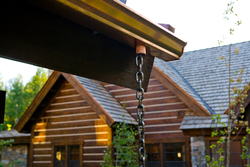
CONSTRUCTION FINANCING
Ideally, financing your custom home is first step you take in the custom homebuilding process because it establishes your budget and helps you prioritize the “must-haves” vs. the “nice-to-haves” for your new home. There are 3 ways to finance your custom home:
• Cash
• Buyer-Financed Construction Loan
• Builder-Financed Construction Loan
Cash
The old adage “cash is king” is not necessarily true in custom homebuilding. While cash is great to have, it does not protect the home buyer and home builder the same way that a buyer-financed or builder-financed project does.
All parties to a construction contract should make an initial determination that answers this question:
What happens if the other party becomes incapacitated, or unable to perform, for any reason?
For a home builder, the loss of revenue during a construction project can have devastating effects.
For the home buyer, the questions that need to be answered include:
• How is the cash disbursed each month to the home builder?
• How are monthly progress inspections made?
• How can I guarantee there are no outstanding liens?
• What happens if the cash runs out?
If it is a cash transaction, home builders will often require a third party to handle inspections and disbursements. Typically, a law firm will handle the transaction, and a required amount of cash must be in the construction account for disbursement every month. “Cash in fund” is typically two (2) months of construction activity. Every month when there is a draw against the fund, that amount must be replenished within 5 working days. This ensures that:
• There is always cash in the fund to pay the home builder.
• The money is disbursed only after a third-party inspection.
• If there are issues during construction, a third party can assist in solving them.
Buyer-Financed Construction Loan
Buyer-financed construction projects are the most popular type of financing. Often called “construction loans” or “custom home loans”, the key element is that the home buyer — rather than the home builder — takes out the loan.
Key Elements
• The contract is a personal-services contact between the home buyer and the home builder to build the home.
• It is not a real-estate transaction.
• Each month, the buyer-financed loan pays the home builder only for the work that was completed and inspected by a qualified, third-party inspector.
• Home buyers typically save significant amounts of money when they finance construction of their home. (When the home builder finances construction, the financing costs are added to the total project cost, and the home buyer ends up paying more as there are two loans vs. just one loan when the project is buyer-financed.)
• An average savings between a buyer-financed project and a project financed by the home builder can vary between 2% to 4% of the total cost.
• Many buyer-financed loans provide an initial “soft draw” that is used by the home builder to pay initial costs such as engineering, blueprints, permits, mitigation fees, and any commissions or franchise fees.
• If any issues do happen to arise during construction, the bank can act as a third party to resolve the issue, and the home builder’s concern about timely payment is mitigated.
Builder-Financed Construction Loan
Builder-financed projects are real-estate transactions because the home builder owns the land and construction until the project is completed. Many home builders prefer a builder-financed project because it allows them to control the entire process from start to finish. If there is an issue, the home builder is in control.
Key Elements
• It is a real-estate transaction.
• The home builder controls the construction project because they are financing it.
• The home buyer is limited to making minor changes (if any) to the home. (The home builder assumes that if their client does not purchase of the home once it is completed, the home builder will have to resell the home.)
• The home builder’s cost to finance the project is added to the total cost of the project — and it often exceeds 4% of the contract price. (For a $500,000 home, for example, this means an additional $20,000 is added to the cost of the home.)
• The home buyer’s mortgage to pay for the home is an additional cost for the home buyer.
Ask for More Information
Sullivan Homes PNW believes the more information our custom homeowners have, the better their decisions will be. Contact us for a video conference call. Any questions and all the answers. We love to talk construction!
Call or text (208) 755-1017
